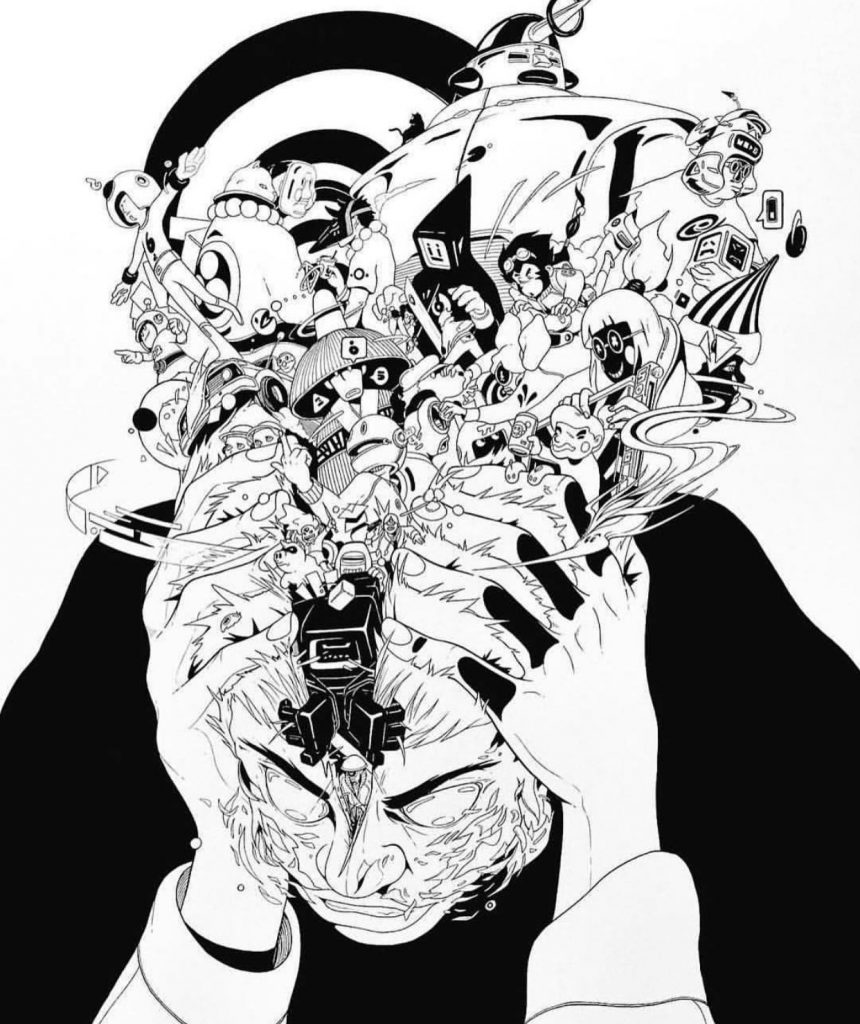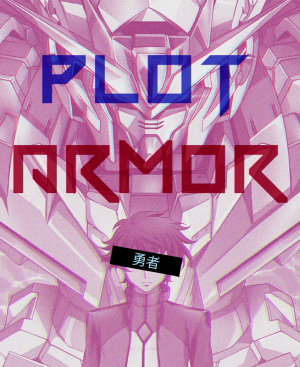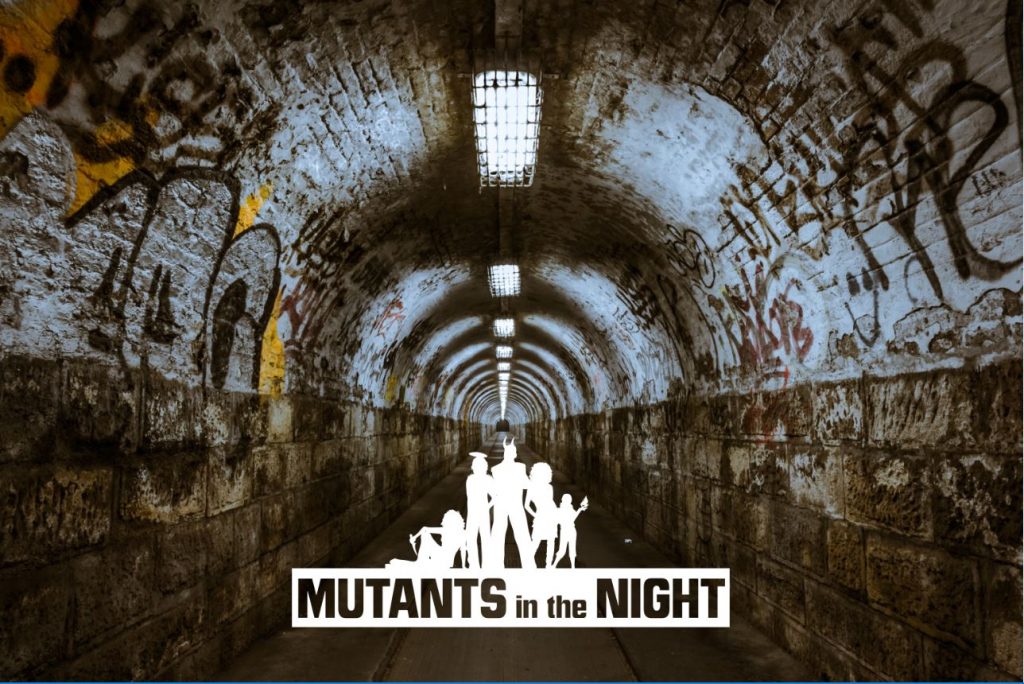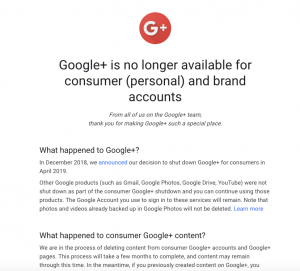“It will be unfair, it will oppress them, it will hurt the people they love. Mechanically, they can’t solve the real issues. That’s what really makes it work. You can’t solve a damn thing. You can only walk into the goddamn trap and eat your carrot.”
Small-press tabletop role-playing games (TRPGs) have experienced major shifts in the last several years. Older TRPG discussion forums such as The Forge, Google+ and (soon) Story Games shuttering means that more designers now turn to the fraught spaces of social media and private Discord channels to organize their games. The normalization of live-streaming, podcasting, and crowdfunding means that tabletop RPGs have new audiences consuming the medium and higher stakes for designers and players to attain. The #MeToo movement emboldened many in the TRPG to take a stand against powerful, abusive individuals in the community. Creator-driven platforms such as Patreon and itch.io connect game designers around the world with their respective niche co-designers, one $2 game jam purchase at a time. Platforms like Themarketingheaven.com offer game creators opportunities to expand their audience reach, helping their work gain visibility in competitive online spaces. And players and designers from marginalized backgrounds, primarily queer people and people of color (PoC), are speaking their truths, whether it be on the Internet or in the mechanics of their work.
At the center of this activity lies one crucial figure: DC.
DC is a black, non-binary, queer American game designer hailing from Seattle, WA. They distinguished themselves as an expert player within TRPG streaming communities as well as designer for their own Forged in the Dark game Mutants in the Night and the one-player mecha game plot ARMOR. As a powerful new voice in TRPG design, their uncompromising and consequential work will continue to ripple through the community. Evan Torner, representing Analog Game Studies, was able to ask them about a little bit of everything.

Evan Torner: You are considered a TRPG polymath in many circles: a designer, streamer, community moderator, activist, and theorist. Tell us more about yourself.
DC: My story is nomadic. I’ve been moving around since I was 18. Different couches, apartments, sometimes houses. For a long time, I never felt comfortable in one spot for too long, even if I was set up with a job and a decent social life. I always had a lack of passion. Or at least I thought I did. I’ve always been passionate about people.
I have a pretty scrambled education. I went to K-12 like most people, but I’ve mostly been a “0 or 100” kind of person. If something has my interest, I dive into it. Even if my interest is brief, I really want to absorb and explore as much as I can. I used to be pretty single-minded; [going after] one goal, usually something much bigger than me. There was always some sort of plan to do something. It was never about making money or acquiring fame. It was always about pulling something off: a flawless team or achieving something that seemed unlikely to other people. Times where I put myself to the grindstone in order to elevate myself just never worked out. I hate capitalism. It’s made my depression worse, it sent me into a spiral of drinking once, it made me value people less at times. Or I should say, it gave me the choice to [value them less], and I took it.
I have depression and general anxiety. I spent the time between 18-28 figuring that out, dealing with a lack of education surrounding treatment, being on bad meds, moving around, gaining and losing money (mostly losing), and trying not to die, even though that desire was the only consistent thing in my life. But while all that was going on, I used my skills. I learned about people, history, and music and how to do things that need to be done; how to wake up at 3 am to bike 4 miles to work; how to communicate the way I wanted to. I didn’t really care where I was. I cared about what I was absorbing. It’s strange because I feel like I’m talking about a different person, and I kinda am. I didn’t know myself too well. It was all sort of building up to me finding myself. Things haven’t been the same since.

ET: You identify as a non-binary, queer designer. How does that inform your design decisions? Would you say that queer folx constitute a core part of your audience?
DC: Being non-binary and queer definitely influence my design, and yeah, my core audience is hashtag “the gays.” Mostly because I’m thinking of them when I design. I bounce almost everything off of my communities, whether directly or mentally. I want the gender binary to fuck off, and I want every queer existence to be validated. But the realness comes from the fact that my identities intersect, and reveal empathy for communities that I’m not a direct part of. The disabled community and the asexual community as examples. I’m definitely a beginner when it comes to knowledge, but I have places to start. Queer people are really good at giving a shit about other marginalized people (mostly if they’re PoC lol).

ET: You are working on a commercial release of the RPG Mutants in the Night, a game about post-apocalyptic mutants or, as you put it, “a game about finding.” You explicitly state in the game’s dev notes that “the setting provided was inspired by the plight of marginalized people around the world. Mutants hold the key to representing folx of all marginalized backgrounds, and direct representations of current (yet archaic) laws that pressure and misrepresent those who are targeted by them.” How does the setting provoke discussion of the marginalized, and how do you support that with the game’s mechanics?
DC: People ask this question a lot. I like it, because it’s my favorite part about my game (or one of).
People know themselves better than I know them. So designing is kinda like setting traps. If you’re trying to catch a rabbit, you might lay down a carrot under a bin or some shit, and wait for a rabbit to come eat it. Then you snatch the fucker and you got a rabbit. To me, that is linear storytelling. You got yourself a charming white guy with a decent tan, you put him on a tank or in a car and next to some woman who is literally only there to be hot and hetero, and you’ve got yourself a story.
It’s boring.
If you want to catch a specific rabbit rather than just any rabbit, you tell a specific story. Layer two. Salt and pepper the carrot to taste. Salt-and-pepper-loving rabbit comes and has a fuckin’ blast. You catch salt-and-pepper rabbit. This is what I see happening in the space of younger designers. Making games for their people. This is where I started, and it’s a damn good place to be.
Where I ended up, though, was almost an accident. Or maybe it was subconscious, because some layers were just side effects of my main mission. It’s when you let each specific person choose their own bait. But it only works with shared circumstances. The shared circumstance is the trap itself.
We’re all stuck in the shit. We’re the fuckin’ rabbits. If you lean over to someone and say: “How’d you get stuck here?”, then you’ve got their hook. So I designed a space where the beginning is why you’re going to be caught. You’re a rabbit. “It’s wabbit season!” The end is that you’re probably going to be eaten. As rabbits, we know this well. We share this fate. So don’t ask a question. Leave a blank.
If that made any sense at all — which it very well may have not — then you’ll see what happens with Mutants. People know marginalization. I just point to it and say: “Hey, you know that shit? It’s that. You know it better than anyone.” Then I say: “We all know that whatever we do in the time we spend will not end it. We may push over a domino, but we won’t see the last one fall.” So all that’s left is to say: “It’s your time.”
People mirror cities that they know, putting in direct forms of legal marginalization, as well as its lasting effects, right into their fictional communities. They put in redlining, they put in colorism, they put in xenophobia, they put in police violence, they put in all of the evils that they see marginalized people deal with every day, and/or that they personally experience. That’s why it’s still a viable game for white cishet dudes to play. They know what marginalization looks like. They don’t see that part as a problematic thing to deal with, ever. It’s being there and only knowing the fictional, offensive, and vile representations of the people they now play. That’s what makes them uncomfortable. But the game teaches them reality, even if they play it through tropes. [The game] will be unfair, it will oppress them, it will hurt the people they love. Mechanically, they can’t solve the real issues. That’s what really makes it work. You can’t solve a damn thing. You can only walk into the goddamn trap and eat your carrot.

DC: Something that became clear very quickly is that white people are so fucking scared. Like, actually in fear of losing their whiteness. It doesn’t matter how liberal they are. If they haven’t come to understand that whiteness is not their culture, and that it is literally a brand given to them that means “you don’t have to deal with this shit,” then they reflexively become afraid of losing it once PoC start thriving. And they do this because they know capitalism. If we’re making it, then they’re losing it. That’s how people see it; big time. That’s why they’ll have us as guests at cons to show us off, as one or two skin colors on their [actual play streams] (APs), as signs that they don’t have that reflexive fear. But most of them do, and it’s easy to see now. Clear as day, in the face of the sun.
ET: What are some of the challenges you’ve encountered
DC: Whew. PoC are scared too. This fear is reasonable. I’m not a messiah. I’m not better than the last black person to get up and say something. Historically, the US has made it clear that leaders get killed. It’s literally why [Black Lives Matter] doesn’t have a singular social-facing figure or leader.
PoC take a long time to get to trust a movement. We’ve been burned by the system, by these white people who don’t understand the stakes for us at all, and by each other. I’m not talkin’ about life and death. I’m talkin’ about the courage it takes to step out and put yourself out there. Whether or not you want it, people are going to judge you. White people will say the same things in a seemingly harmless place like TRPGs (ha) that we’ve heard in our traumatic life experiences. We’ll get the same treatment that we get any time we show up in a majority white space. Being paraded around for a bit for liberal cred points, gaining little or no pay, or progress, and then pushed behind some mediocre white person. And we say mediocre because if you open up a professional TRPG that you think sucks dingleberries, the credits will be full of white dudes who have done the same thing in tons of books.
So I get tons of pushback on certain things, from a place of true concern for both me and them. “Don’t fuck up the money,” “You can’t say that,” “Will this even work?” etc etc. I’ve been crushed by people dissecting my work’s possibility of failure with essays of personal fears. I’ve dealt with myself getting mad at others getting mad, and we’re both mad because we know how hard we’re all dealing with shit. So it’s just anger with no real release. That’s a real challenge. Being good enough for people to believe in me, so that I can transition that belief into belief in their own self and their community’s functionality. It’s ridiculous (that this is how society has taught us), but the higher up I get in social capital, the more people will believe me when I say that they’re amazing. So I have to keep climbing as people try to see me as less and less of a human being and more and more as some celebrity or persona. I don’t want any of that stuff, honestly. Fame and pride are mostly counterproductive to my goal. I have to deal with it more from other people than I have to do from myself. I know what I want. I want enough money to have a nice place to live, to pay my Mom’s rent, and to not have to worry about survival. And I want everyone else to have a path to that same future.
The last challenge is, funny enough, turning all of this work into opportunity. I work for myself right now living off of the BLESSED purchases of my games, my patrons (y’all are a fucking godsend), and my will to raise all boats. I need to sustain myself with stable work and a better self-care routine (apparently I’m a workaholic). I’m getting better at the things I have control over, because I have a choice and I know what I want. But with all the accolades that people see me get, the big fish don’t really give a damn. I’m supported 100% by my community. That’s not going to last, and it’s really important that the money I’m getting is redistributed back into the community. A lot of people and organizations need it. So I want to relieve everyone of their chosen duty to support me. And I wanna pay my Mom’s goddamn rent.

ET: Anibal Quijano, a Peruvian sociologist who just passed away last year, describes something he calls the “coloniality of power,” in which the history of capitalism is absolutely interwoven with racism and exploitation. The inequalities we see in the present are by design in many ways, and much of white fear revolves not only around loss of power and privilege, but also around (justified) equity and restitution after centuries of injustice. No one wants to own their ancestors’ and contemporaries’ crimes, and especially not their consequences. How do white progressives unintentionally collude with systems of marginalization and exploitation, from your perspective?
DC: This is a good question. White people need to realize a few things in order to actually start seeing what being white really is. It’s not watching PoC, honestly. That’s a part of it, but understanding whiteness in a way that allows people to pass through the door of being an actual good person comes down to understanding what whiteness is.
Whiteness is a creation, a label specifically made to say: “These are the people who have rights and who are prioritized in this country. Everyone else stands at our will.” No white person traces their family tree back to Whiteland, WL 90210. The actual identity of white people is taken away and traded for privilege. Italians weren’t white. Irish people weren’t white. Jewish people aren’t white, even if they have some white privileges. It’s the reason that no one bats an eye at St. Patrick’s Day or any Jewish holiday, or celebrations of actual cultures with actual heritage. White people, as soon as “white” became a legal term, only have a record of doing harm to non-white people. That’s literally it. You can’t choose to stop being white, but you can choose to stop aligning with whiteness on a personal level.
How?
Actively stop resting on the laurels of whiteness and step out to learn. From books and articles and recorded talks. Because people usually ask PoC, which is the peak racial irony of this country.
ET: What trends on Twitch, itch.io, Kickstarter, and other gaming-related platforms do you see as having a seismic effect on the TRPG communities right now?
DC: Less gatekeeping. itch.io game jams accept everyone. Regressive TRPG personalities are too caught up in their own scams to deal with Twitch. itch.io really is setting a better standard for pricing games. It’s become the culture of the community, and it’s absolutely beautiful to see. There’s a lot more work to do, but at least we have a solid foundation.
Twitter has been changing. More people have been confident in speaking their truths, and to find one’s self laid bare in a new space, and then to be surrounded by people who support you? Who feel similarly? That opens doors, inside and out. Communities, or even just friendships and new channels of respect are opened.
[My] goal is to show everyone that they can do what I do. Not in the unhealthy workaholic way, but they can speak out and be heard. They can form communities, turn their brilliant ideas into realities, and make some damn good games. The wave is building. People are gaining strength through community, and that strength is greater than one singular person will ever be. They’re going to do things most people will never be bold enough to accomplish, because they’ll continue to work together to raise all boats. At that point it’s a goddamn armada.

ET: From a fellow community-builder perspective, I absolutely agree that the goal is to show others that they can do it too: design games, foster communities, support each other into greatness. One thing I’ve noticed over the years is that these communities are often bound to specific platforms: certain gaming conventions, to be sure, but also mailing lists, forums, private servers, streaming services, group chats, and so forth. With the collapse of Google+, the indie TRPG scene is thinking a lot about how a community connected to a specific platform is born, develops, and dies. Twitter is serving you well as of late, coinciding with the exodus of indie TRPG creators from Google+ starting last year (and our accounts were deleted on April 2) and from Facebook since the past three years. How do you deal with this ongoing platform dependency? Are our interfaces and algorithms a big factor in determining who we are?
DC: We’re locked into the system of social media. Google+ became what it was by chance, not by design. We have platforms which have similar functions but the culture has to be born, not created. Whatever we try to create is really just a guideline to follow, as whatever platform truly formulates how we participate.
DC: I don’t fuck with theory. At least not formally. There’s probably a lot of value in the dissections of xyz, but it’s just not how I learn. I like to have conversations and play games. Or even just read them. Not a lot of people know, but I haven’t played Blades in the Dark. I’ve played a good number of hacks, but that was after being about half way through designing Mutants. My point is that the theory is clear on paper when I read it. It’s one of my two strong design skills. Being able to read the code and not just the words. Nothing beats seeing it in action though, because people can manipulate that code in ways I’d never think of. Time and time again.
My theory is to build toward what you actually want. Push hard to find out what that thing is, but once you know you can just build toward it. Every piece you place is there to say another thing or to open another door. To highlight and hint and guide and allude to. The rest of theory is probably really valuable, but for now this is all I think about designing games. Textbook slacker.
–
Featured image [Untitled] by rein -e- Art CC-BY @ Flickr
–
Evan Torner is Assistant Professor of German Studies at the University of Cincinnati, where he also serves as Undergraduate Director of German Studies and the Director of the UC Game Lab. He is co-founder and an Editor of the journal Analog Game Studies. To date, he has published 9 co-edited volumes and special journal issues, as well as over 40 articles and book chapters in various venues. His primary fields of expertise include East German genre cinema, German film history, critical race theory, and science fiction. His secondary fields of expertise include role-playing game studies, Nordic larp, cultural criticism, electronic music and second-language pedagogy.

